|
I've always loved reading the newspaper. There's a famous family photo of seven year old me sitting at the kitchen table at breakfast, looking haggard in my bathrobe with my newspaper in front of me as serious as can be.
I still read the news a lot, my favorite thing being the weather. Growing up on the Texas coast, I loved tracking the hurricanes hurtling towards us from the Gulf. But now that I have moved to a landlocked state, I've had to broaden my interests from hurricane watching and on to current events. It was only this year though that I realized how I could use my insatiable desire to read about what's happening in our world for my writing. If writers are avid people-watchers, then it should be no surprise that I have become an avid event-watcher as well. Reading the news has given me the fodder I need for several short story ideas. No matter what kind of news stories interest you (weather, politics, science, etc.) you too can use them as a springboard for your creative writing. Current event writing exercise: Visit a news or weather website, or open up a newspaper (if you're old school like me). Skim around and find an article that piques your interest. Try free writing for five minutes using that article as a jumping off point, incorporating some of the details into your own writing. See where it goes! Need somewhere to start?
0 Comments
 I love organizing. Give me some cute storage containers, to-do lists, and a colorful planner and I'm happy. But by far my favorite tool for keeping organized is the Excel spreadsheet. I use spreadsheets all the time at work to keep track of my different projects, and it makes sense to use them with my writing as well. If you're a writer then you're going to want to put your stuff out there for people to read. And that's when it becomes so important to keep good notes. Below are my three favorite spreadsheets that I use the most. I've included the templates to each of them at the end of this blog in case you're interested. You can adjust the templates, delete and add columns, and mold them to suit your needs!
Whether it's from work, stress, or exhaustion, sometimes your creativity well runs dry. I realized just a couple of weeks ago that my story idea inventory was getting low. I didn't have enough creativity to think of new ideas, but I was able to fall back on a few tips to spur my writing brain back into action.
So if you've run out of ideas or are just on the lookout for new ways to inspire your writing, some of these tips may be for you too.
Hopefully if your writing well has been dry, these few tips will help you tap into a new source for ideas. Best of luck! 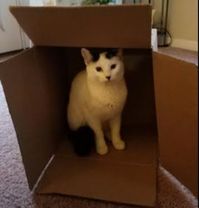 Photo copyright Jessica Cook Photo copyright Jessica Cook It's time you all know something about me. I'm an obsessive drafter. Nothing is ever finished, it's just assigned a new draft number. Now I know editing is good and you should have multiple drafts of your story, it wouldn't be right to send out the first draft and call it done. But my problem is I can't stop. If you're an obsessive drafter like myself, and have problems letting a story go, you're in good company. But we can't stay like this forever. When is it okay to call it quits or send it out as is? This is something I'm still figuring out. But for now, here is my feeble attempt to understand the need to keep drafting and how to stop the cycle. First of all, there's the mindset. What makes an obsessive drafter? 1. The Perfectionist: For me, everything I do has to be perfect. I've been a perfectionist for most of my life and my writing is no exception. The only problem is, writing is far from perfect. It will never be done, editing is messy, you can always make it better, and you'll probably always be able to find errors. Thus, the endless string of drafts. 2. The "I'm a bad writer" voice: You know those times when you sit down to write and that little voice keeps telling you that you're not good enough? You think about all the authors you love and admire and feel you can't possibly compare. So what do you do? You keep editing and making more drafts of that same story, putting off sending it out. 3. The "This story stinks" voice: Most often this little bugger accompanies, or even precedes, the "I'm not a good writer" voice. For some reason, your story just isn't right in your eyes. So you keep trying and trying to fix it. Eventually, you're so deep in drafts that you don't even feel like it's getting better, it's getting worse! 4. The Procrastinator: When a story is done, the hard part starts. Now it's time to send it out and open yourself up to possible rejection and criticism. That doesn't sound pleasant at all and before you do that, you really should fix this, this, and this in your story. So you keep on drafting. The sad truth of obsessive drafting is this: obsessive drafters will never be published. Our stories will forever be "in the works" rather than in the readers' hands. So how do we combat this need to keep holding onto our stories when it's really time to let them go? Breaking the obsessive drafter mindset: 1. The Perfectionist: I've learned to deal with my tendency to be a perfectionist in other areas of my life. Now it's time to do that with my writing. After getting our cat, I eventually gave up on having the bathroom floor 100% free of little bits of cat litter because after a week of constant sweeping, I came to the conclusion that it was just part of the deal of having a fun cat around. I'm trying the same approach with my novel. There will be places that don't quite sit right and scenes that could be better, but it shouldn't stop me from sending it out. I know it can always improve, but it has to stop somewhere. That's just part of the deal of being a writer. I don't want to miss out on being published because I was too knee deep in drafts. Besides, editors are there to help make your story the best it can be, so let them do their job and help you. But in order for that to happen, you've got to send it out first. 2. The "I'm a bad writer" voice: I draft and draft because I feel insecure about my own writing abilities. Everyone does at some point. That's when I step back from my story for a bit and look at all the things that I have gotten published, won scholarships with, or had good feedback on in writing groups. Encourage yourself and don't forget about your past successes. Something that can always pull me out of this slump is a comment that my college creative writing professor wrote on a story of mine: "You are a writer." Plain and simple. I have that written on a note card above my desk to remind me to be confident, keep learning, and to not be afraid to send things out for others to read. 3. The "This story stinks" voice: If you're an obsessive drafter, then you've been staring at your story for a long time. Much too long. If you've never taken a break from it, then do that right now! If you come back a couple months later and it still doesn't feel right, here are some things you can do instead of starting yet another draft:
4. The Procrastinator: First of all, ask yourself why you write. Is your story for your eyes only? I'm guessing if you're an obsessive drafter you've put a lot of time and energy into this thing, so the answer is most likely no. The reality is, you want readers. That means you have to send it out. Edit for grammar, spelling, and then even if it's not perfect, pull the band-aide off and send it out. Rejection and criticism are part of the deal. It's just the reality of being a writer. Besides, it may get accepted! You'll never know until you try. I'm not saying I have it all figured out, but writing should be fun and it should be shared. So let's stop drafting and get those stories out in the world where they are supposed to be.  Photo Copyright of Jessica Cook Photo Copyright of Jessica Cook Well now, it's mid-January. The holidays are over, the bleak midwinter has started, and there are no more excuses for me not to write. Which is why I've decided to give myself a little motivation. I've never done New Year's resolutions before, but this year I've made an exception because for the first time in my life I'm finding it very hard to sit down and write. My first real job, being married, first apartment, it all begs for my time. Not to mention our newest member who we adopted from the animal shelter. He likes time too and I am all too happy to give it to him. So I've made a list of things that I want to accomplish with my writing this year. I'm not going to hold too rigidly to them, it still has to be about enjoying my writing and not about a checklist, but it doesn't hurt to play into my other enjoyment of crossing things off lists! Here it goes, my first New Year's Writing Resolutions: 1. Submit three short stories to journals. (They don't have to be accepted, just have to get out there.) 2. Read and write about at least one book each month. 3. Start keeping a journal again. (I'm afraid I've grown a little too relaxed in this department.) 4. Pick up where I left off at 50,000 words and finish my NaNoWriMo novel. What are your New Year's resolutions? Even if you haven't gone so far as to make a list, what are you hoping to improve in your writing this year? Congratulations to all of you who survived NaNoWriMo! Even if you didn't finish your novel, you still pushed yourself to write and achieved good, daily writing habits. That's so awesome and don't let them fade away.
Now the holidays are coming up and usually that means family, food, and no time to write. But, lots of time to read! I don't know about you, but I have been starving for a good book lately and am planning to spend most of my down time during Christmas curled up by the fire reading for hours. If you decide to do the same, don't feel guilty that you are neglecting your writing. Everyone needs a chance to recharge and the best way to do that is to fill your time with reading. You've probably heard teachers and professors say that reading will help you get better at writing, and I'm here to tell you that it's definitely shown to be true in my life. But there's more to it than just reading through a book and absorbing the author's talents through osmosis. Look at it this way, when you read a book don't just be a passive audience, be a student and have the attitude that you are learning from a master. The first step to doing that is to pay attention. When I read, I try to pay attention to these specific things:
Learning from a master means recognizing what other authors are doing right, but it also means realizing when they've missed the mark. Don't ignore the things that bother you in books that you read. Knowing what to avoid or finding ways to improve something is just as helpful as practicing things done well. Ask yourself: Why does the main character rub me the wrong way? Why am I not able to connect to them? What's missing in the story world? Why is the plot not keeping me engaged? Why does the prose or dialogue drag? If you're a journaler like me, then I highly recommend keeping a book journal. I read a lot and it helps me to remember everything that I've learned. It doesn't have to be an intensive documentation of every book you've ever read and every feeling or thought you had while reading. Mine is pretty simple and entries take a paragraph at the most. If you're interested, this is how I use my book journal:
There you have it! Go buy yourself a new journal (you deserve an early Christmas present), pick up a book, and start learning from a master. Happy reading! So far, I've kept up with the daily word count goal for NaNoWriMo. Sometimes I even find myself a day or two ahead! But now Thanksgiving looms and while I'm looking forward to spending time with my family, that also means no time to write.
My solution? Write like crazy before Thursday. That way if I don't find time to write, at least I'm not terribly far behind. A great way to do this is write-ins. Check with your NaNoWriMo region to see if there are any events going on near you. Just last night I attended one and the accountability and word sprints pushed me to write 4,000 words! If there are no events near you or you can't attend any, here are some writing sprints you can do yourself. Just set a timer and start writing. Don't stop to edit yourself! The goal is to crank out as many words as possible. See if you can make it to the word goal or even past it in the time given. If not, that's alright, these are supposed to stretch you. Make sure you take a short break in between sprints to reorganize your thoughts and remember, you can always go back later and edit!
If you can find time to write during the holidays, that's great! Couple it with a few sprints and that's even better. Here are some tips to keep writing when on vacation:
Have a happy Thanksgiving!  Photo copyright of Jessica Cook Photo copyright of Jessica Cook I'll be the first to admit it, week two has been tough. I've had to rely on all of the extra words I wrote during the Write All Night in order to keep myself afloat. Still, I try to meet the daily word count goal or at least chip away on my story every day. I am now at 23,000 words. It's time to take a break and and take stock of where I am now. I encourage you to do the same. So far, the plot seems to be shaping up nicely. The intro is kind of long and I know during revisions that I will probably have to get rid of several of my beginning chapters. But hey, at least it's going somewhere and I haven't run out of things to write about yet (knock on wood). First of all, I really love my setting. My story takes place on a little Atlantic island with a bustling town and a mysterious lighthouse. There's hidden coves, bluffs, winding dirt highways, and a bay that is dangerous for large ships to sail into (due to the rocky spires that surround the base of the cliffs). The setting is what brings the story alive for me. Especially with the mysterious fog that has begun rolling in. An omen for things to come? Maybe so. My characters are becoming more and more lovable and interesting as I get further into my story. At the beginning they all felt pretty flat and some still do. But, I think that I have discovered more about them as I have written and gotten more invested in their lives. It's fun to watch them go from a character outlined on notebook paper to a person who I feel like I know. For example, I knew before I started writing that Thomas, one of my main characters, was orphaned when he was around fourteen years old. It was tragic, it drove him to a leave his home country, and he becomes a sailor without any family or home to anchor his wandering spirit. However, what I didn't know was how his father's death was even more devastating for him than his mother's. And how the stories that surrounded his native country are going to drive him to a tough fork in the road later on. I'm looking forward to exploring this more and seeing how that impacts his relationships with the other characters. Meanwhile, I still have a long ways to go with my other main character, Helena. She will need some editing to bring her up to where Thomas is right now. I've given her interests (she is obsessed with myths and legends), a past (her mother's mysterious death and her father's increasing paranoia), and she has a stake in the story (this could be her last chance for freedom), but she still doesn't stand out. Maybe I need to develop her personality more or increase her accountability. What will happen if she does take a chance? The repercussions should be bigger. And then, there are some side characters that I initially just threw in for Thomas to dialogue with who've turned out to be my favorites. One of them is a very hairy sailor named Standfield. He's overly superstitious and has a seaman's tale ready for any situation. The captain of the ship is a very logical and sensible man and usually dissuades such nonsense. But Standfield's stories keeps the crew entertained and their minds far from ideas of disobedience and mutiny, so the captain makes an exception. However, it starts to become unnerving when Standfield's outlandish stories start to come true. I hope you take a break this week and look at how far you've come. Who are your favorite characters? What is great about your setting? Remember, this is a first draft. Not everything has to be perfect the first time. Instead of letting that keep you from writing, just make a comment in your word document to remind you to come back later during editing. Week three here we come! I have officially completed the first week of NaNoWriMo 2016. Feeling pretty good about it too. Here's how it all went down:
10/31 Day Before: Sitting on my couch watching a Halloween movie (Hocus Pocus to be exact!) and thinking, "You know, the scariest thing I've experienced today is the knowledge that NaNoWriMo starts tomorrow." Day One: I didn't have any time to write this morning, because who is awake enough to write at 5:00 am? And then finally when I got home from work at 4:00pm, I was legitimately nervous to begin writing. What if I choked at the start and can't even think of an opening scene? I knew I should be writing, but bugging my husband instead was easier to do. My husband also knew that I should be writing and dutifully banished me to my desk. Miraculously, I made my word count today. I even did a little extra just because. Day Two: I actually motivated myself today and wrote up to my word count pretty easily. I tried to push myself to do a bit more like yesterday, but then my husband started making burritos. I looked down at my keyboard, then back at the kitchen, conflict raging within me. Then promptly abandoned my novel for the burrito. *Sigh* How fickle is the heart... Day Three: I joined my first NaNoWriMo writing group today! My friend and I came in mid-sprint where everyone was gathered at the mall. So we awkwardly started writing until the current sprint ended. At the start of the next one, our goal was to write 747 words. I came up short at 728. My friend shamed me with her exorbitant word count and I resolved to do better next time. Word count goal for the next sprint? 1,298 words... I smacked my forehead in despair. As the clock ticked, I threw out all of my perfectionist tendencies and wrote like a crazy person until I actually started to sweat. This time when we called out our word counts, mine was 1,544. I do a quick mental fist pump in the air. Day Four: Today was the Write All Night at the library. My friend and I weren't able to come at the very start, but we got there around 8:00pm and jumped right in. It was so cool to see so many authors working away. The sound of keys tapping filled the room and you could feel the pressure as we all strove to meet the word count sprints. I broke 10,00 words today, woot woot! All in all, it was a wonderful experience. Day Five: Well, I'm ashamed to say it, but today wasn't as productive as compared to the rest of the week. I spent my time editing and filling in gaps that I noted during the Write All Night which was a good thing. However, I only got in a measly 700 words and then lost steam. I had hoped to use the weekend to really get ahead but I'm afraid that was not to be. Day Six: Instead of writing this morning, I took a two hour nap. I suppose I needed it though, and came in strong and met my word count later this evening! Here's hoping that the structure of the upcoming work week will force me to crank out those words again! Hang in there everyone! Do what you can and keep on writing! Howdy, folks. Well, here we are. Week one of NaNoWriMo. I have the strangest feeling that I have been here before. Ah yes, that's right. It's because this is my 4th year trying to do this! Woohoo! And let me tell you, this first week has been very different (in a good way) than the other three times and I think I have figured out why. This year I have been on track with my word count every day, which is a very odd thing for me the first week of the challenge. Let's go on a walk down memory lane, shall we?
Anyways, I was darned determined to complete the challenge this year because I know that I can write and I know I've done it before (2013, you're always taunting me). So I buckled down and got organized (Read about how I prepared for this year at my three NaNoWriMo prep blogs: NaNoWriMo - You've Been Warned, Letting It Marinate, and Getting In Shape.)
So wherever you are in your NaNoWriMo journey, don't get discouraged and keep pressing on. Some years will be flops, others will be successes! Sometimes you just have to play around with things and see what will give you your best shot at making it to those 50,000 words. For me, I think there are four things that I can attribute to this year's "on track" phenomenon:
That's all for today! Check back here on Sunday to read my play by play about this year's first week of NaNoWriMo, shenanigans and all. How is your NaNoWriMo experience so far? Is this year different than past years? Good luck and happy writing! |
AuthorHi, I'm Jessica! I'm on a mission to make my writing better in hopes of becoming a published novelist. It's been a crazy journey so far as I learn the twists and turns of the publishing world, but it's been worth it. Though I'm still learning how to be the best writer I can be, I'm excited to share what I learn with you. Happy writing! Archives
August 2023
|
||||||||||||||||||
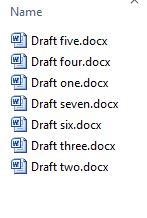
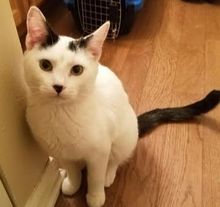
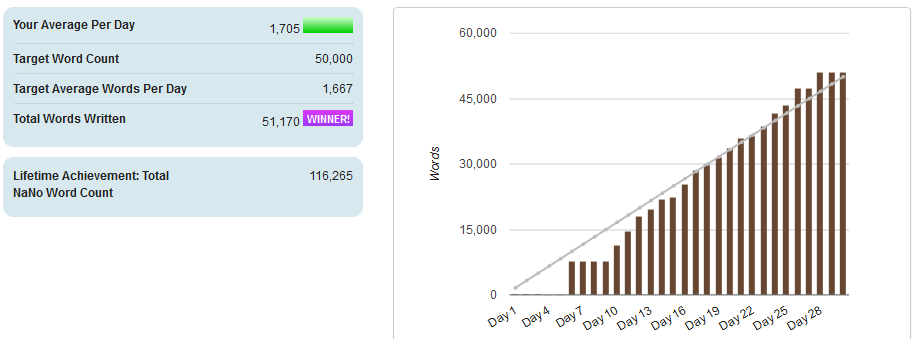

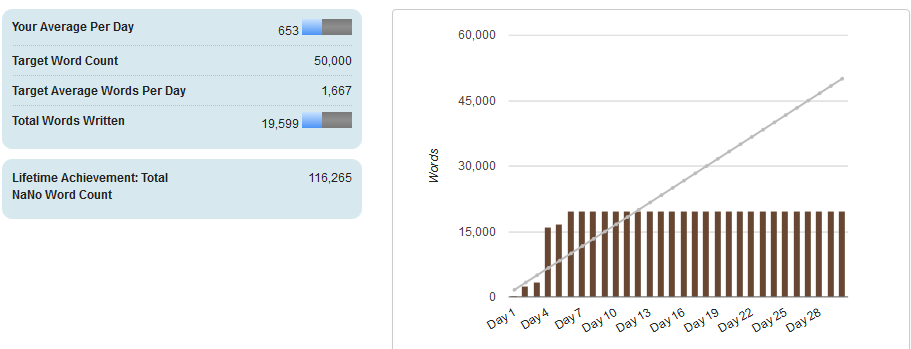
 RSS Feed
RSS Feed
